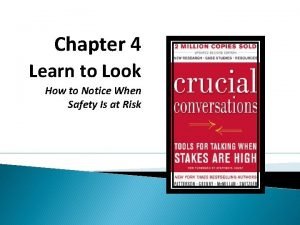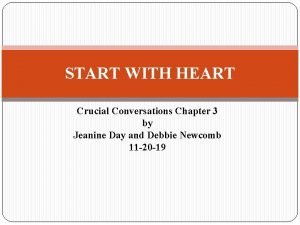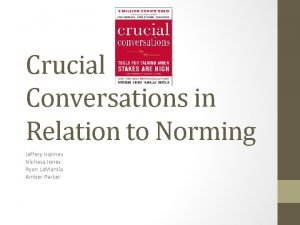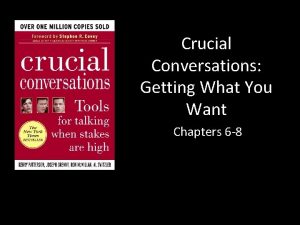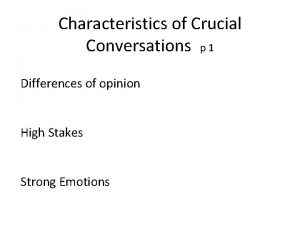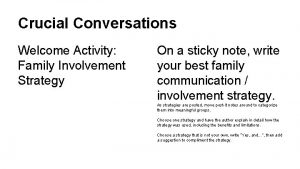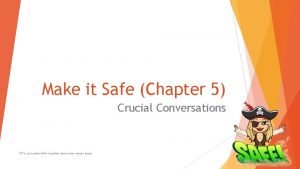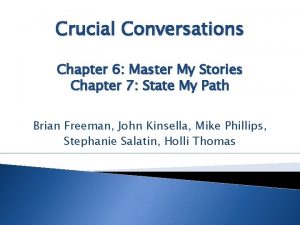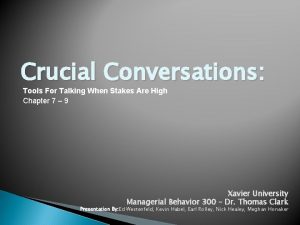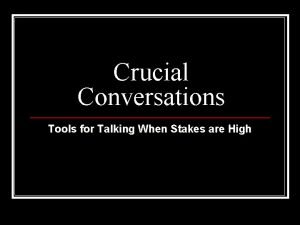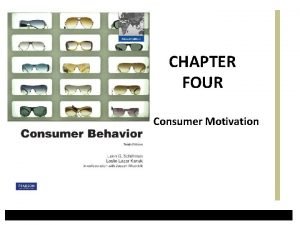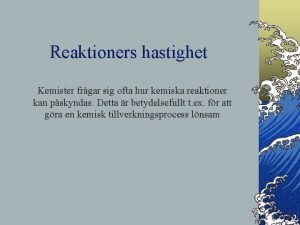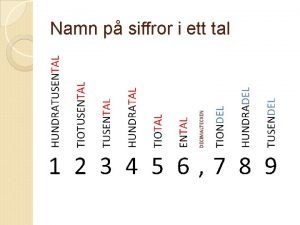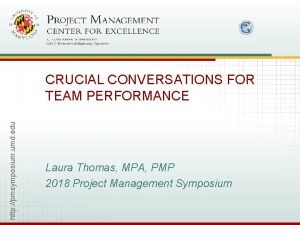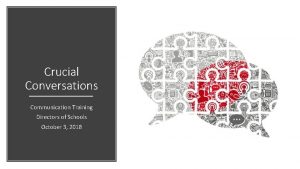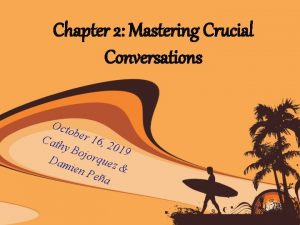Goals for studying Crucial Conversations Use Crucial Conversations





































- Slides: 37

Goals for studying Crucial Conversations Use Crucial Conversations principles to aid in conducting targeted performance based discussions Provide practical solutions to handling difficult conversations

Generic Emotion Scripts (adapted from Shaver et al. , 1987) Emotions Described by Respondents Script Elements Joy Anger Love Fear Antecedents -A desirable outcome; getting what was wanted (68%)1 -Task success, achievement (54%) -Receiving esteem, respect, praise (33%) -Judgment that the situation is illegitimate, wrong, unfair (78%) -Real or threatened physical or psychological pain (57%) -Violation of an expectation; things not working out as planned (54%) -Having spent a lot of time together, having shared special experiences (33%) -P finds O attractive (Physically and/or psychologically) (28%) -O offers/provides something that P wants, needs, likes (22%) -Threat of harm or death (68%) -Being in a novel, unfamiliar situation (43%) -Threat of social rejection (28%) -Being alone (walking alone, etc. ) (28%)

Generic Emotion Scripts (adapted from Shaver et al. , 1987) Script Elements Joy Anger Love Fear Behavioral Responses -Smiling (72%) -Communicating the good feeling to others (40%) -Positive outlook; seeing only the bright side (40%) -Verbally attacking the cause of anger (69%) -Loud voice, yelling, screaming, shouting (59%) -Thinking “I’m right, everyone else is wrong” (38%) -Feeling happy, joyful, exuberant, etc. (52%) -Smiling (44%) -Feeling warm, trusting, secure, etc. (43%) -Feeling nervous, jittery, jumpy (48%) -Picturing a disastrous conclusion to events in progress (42%) -Talking less, being speechless (31%) Self-Control Procedures -Suppressing anger; trying not to show or express it (20%) -Redefining the situation (11%) -Acting unafraid, hiding the fear from others (23%) -Comforting oneself, telling oneself everything is all right, trying to keep calm (22%)

Characteristics of Crucial Conversations p 1 Differences of opinion High Stakes Strong Emotions

We are wired to fail in crucial conversations pp 4 -5 We are • designed wrong: fight or flight • under pressure: caught off-guard by the unexpected • stumped: Uncertainty as to how to react We act in self-defeating ways: We say and do things that reinforce a downward spiral

Types of crucial business conversations p 8 • • • Addressing a serious concern with a co-worker Giving feedback to a supervisor Assessing a co-worker’s performance Explaining missed deadlines Dismissing an employee Communicating about critical compliance issues: safety, security, environmental, diversity, financial

Benefits of mastering crucial conversations pps. 11 -16 Reach career goals Improve your organization Strengthen relationships Improve health

Exercise 1 • Relationship • Circumstance • Crucial Conversation

Skilled dialogue p 23 -26 Focus on shared goals and meaning Encourage rational explanations of thoughts Learn to listen, ask insightful questions Focus on facts and reasons Offer tentative paths to test other’s reactions

Becoming effective at dialogue p 34 • • • Be humble. Work on self first Realize your communication often predicts/creates the subsequent behavior of others Commit to learning new habits to replace unproductive ones

Ambrose Bierce, The Devil’s Dictionary • Speak when you are angry and—you will make the best speech you will ever regret • Avoid • Debating, arguing, confronting, accusing • Hints, sarcasm, innuendo • Silence, passive aggressive behavior

Exercise 2: Language matters Handout: Your communication often predicts/creates the subsequent behavior of others 1. With your team, alternate reading the statements in the middle column with feeling. Talk to your partner(s) about your probable response if someone used that language in addressing you 2. Now follow the same process in reading the alternative language in column 3. Talk to your partner(s) about why this framing would cause a more positive reaction.

Exercise 3: Listening skills: The impact of nonverbal communication Who you are speaks so loudly, I cannot hear what you say Ralph Waldo Emerson

Exercise 3: Speakers judge your listening skills by your behavior Ø How do you know someone is listening to you? • Eye communication; undivided attention; encouragers; nonverbal positives, writing something down Ø How do you feel when you know someone is listening to you? • Respected, valued, confident, liked Ø How do you describe a person who is listening to you? • Courteous, attentive, empathetic, respectful

Exercise 3: Speakers judge your listening skills by your behavior Ø How do you know someone is ignoring you? • Lack of eye contact; other signs of indifference Ø How does it make you feel when you are ignored? • Nervous, insignificant, unintelligent Ø How do you describe a person who has ignored you? • Rude, arrogant, distant, jackass

Communicate for your audience • Communicate in terms of your objectives not in terms of your feelings (The advice to “Be Yourself” is misleading) • Understand what interpersonal and professional criteria are for crucial conversations • Plan your behavior in terms of meeting both sets of criteria

Adopting a dual perspective p 51 • Importance of holding a dual perspective, keeping own objectives in mind while looking at situation through the eyes of the other. • Look for physical and emotional signs of a crucial conversation

Establish a mental model for success criteria p 32 • Know what you want for – self, – others, – & your relationship • Define criteria for communication success – Outcome: specific, measurable, challenging – Acceptable to all parties – Conversation takes a reasonable amount of time

Greta’s first reaction to opposition • Unhealthy motives: winning, punishing, keeping the peace • Unanalyzed feelings • Harsh judgements

Start with Heart, Greta’s story pp 33 ff Clarify what you do want: understanding, encourage cost reduction Clarify what you do not want: winning, punishing, keeping the peace Refuse the Fool’s Choice: silence or violence Present your brain with a more complex question: E. g. , How can I express my real concerns without offending the other person?

Beaumont HS: Royce vs Brent • Brent attacks Royce with high emotions • Acts even more emotionally when others do not support his attacks. • Accepts the Fool’s Choice • Is blind to his role in situation • His motives degrade

Fool’s Choice Should I be honest or kind? Should I say what think or show loyalty? Should I try to win or let you win? Should I hold my ground or admit your point? • Should I speak with confidence or make it safe for you to disagree? • •

Answer these questions about one potential crucial conversation • What makes it hard to speak with this person? • What conversation are you not holding or not holding well that frustrates you? • What are the consequences of not resolving these issues? • What positive results would occur if you were able to hold an effective conversation

Those who fail to plan, plan to fail pp 40 ff Start with the end in mind: Know what you want for – Self & others, task and relationship Define criteria for communication success – Outcome: specific, measurable, challenging – Acceptable to all parties – Conversation takes a reasonable amount of time

Mental rehearsal Ø Before you enter a situation, visualize what you are going to say and do—and then mentally rehearse how you believe your audience will respond Ø At the same time, visualize what your audience’s most preferred communicator would be saying and doing. How close can you come to their “ideal other”?

Words of Wisdom from St Paul Be gracious to everyone you meet, for you never know when you are entertaining an angel

The golden and platinum rules Ø Golden: Treat others as you would like to be treated Ø Platinum: Treat others as they would like to be treated

Refuse the Fool’s Choice • Find your bearings • Refuse the Fool’s Choice • Identify a more complex problem

Becoming effective at dialogue p 49 • Keep it safe: What would the other person want to hear me say first • Know what you don’t want – Attack or withdraw • Consider a plan for how you can achieve what you want while minimizing interpersonal distractions from goals

Exercise: Praising in 5 sentences • What: I appreciate the excellent job you did in producing the brochure for my business. • Why: It exceeds our expectations and will help us promote our business more successfully. • Details: Specifically, you incorporated all the company values we asked you to include, you used color very effectively to highlight headings and bullet points, and your design was far superior to our original conception. • Impact: In short, we plan to continue our partnership because of the excellence of the production values you bring to our print materials. • Close: So keep up the good work. We notice it and appreciate it

Sounds of silence, p 52 • Masking: Sarcasm or couching • Avoiding • Withdrawing

Violence, p. 53 • Controlling • Labeling • Attacking

Take and grade the stress test, p 56 • • • Masking Avoiding Withdrawing Controlling Labeling Attacking

Build safety p 65 Focus on mutual purpose mutual respect Approaches apologize contrast to confirm understanding and respect brainstorm for effective strategies

Examples of Emotion Norms In response to sadness: “Being unhappy is sometimes a sign of failure. Successful people are always happy. ” “I never really felt sad or despondent at work. I attempted with a fair degree of success, to detach myself from my surroundings so that I would make rational, reasonable, and prudent decisions. I was a management machine. ”

Control your emotions p 93 • Use the 6 -second rule • Separate facts from conclusions • Avoid 3 explanations – Victim – Villain – Helpless

Reframe the situation p 102 • Consider own role in situation • Humanize the other • Evaluate what actions you can take to achieve your business and interpersonal objectives
 Strategic goals tactical goals operational goals
Strategic goals tactical goals operational goals Strategic goals tactical goals operational goals
Strategic goals tactical goals operational goals Learn to look
Learn to look Crucial conversations start with heart
Crucial conversations start with heart Crucial conversations
Crucial conversations Crucial conversations chapter 6 summary
Crucial conversations chapter 6 summary Crucial conversations role play examples
Crucial conversations role play examples Constructive structure asl
Constructive structure asl Crucial conversations 7 principles
Crucial conversations 7 principles Characteristics of a conversation
Characteristics of a conversation Crucial conversations
Crucial conversations Crucial conversations role play exercises
Crucial conversations role play exercises Crucial conversations ppt
Crucial conversations ppt Crucial conversations ppt
Crucial conversations ppt Chapter 6
Chapter 6 Crucial conversations ampp
Crucial conversations ampp State your path
State your path Crucialconversations.com/exclusive mutual respect
Crucialconversations.com/exclusive mutual respect General goals and specific goals
General goals and specific goals Examples of generic goals and product-specific goals
Examples of generic goals and product-specific goals Desuggestopedia method definition
Desuggestopedia method definition Advantages of desuggestopedia
Advantages of desuggestopedia Rbk fuktmätning
Rbk fuktmätning Lufttryck formel
Lufttryck formel Personalliggare bygg undantag
Personalliggare bygg undantag Förklara densitet för barn
Förklara densitet för barn Elektronik för barn
Elektronik för barn Borra hål för knoppar
Borra hål för knoppar Tack för att ni har lyssnat
Tack för att ni har lyssnat Smärtskolan kunskap för livet
Smärtskolan kunskap för livet Teckenspråk minoritetsspråk argument
Teckenspråk minoritetsspråk argument Epiteltyper
Epiteltyper Frgar
Frgar Autokratiskt ledarskap
Autokratiskt ledarskap Humanitr
Humanitr Tallinjen
Tallinjen Toppslätskivling dos
Toppslätskivling dos Vad står k.r.å.k.a.n för
Vad står k.r.å.k.a.n för


